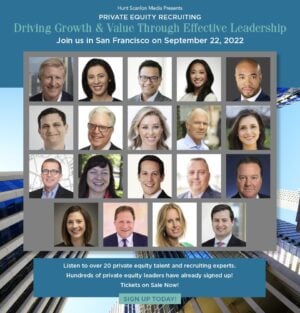Executive Recruiters Enjoying Best Run in Over 20 Years

June 9, 2022 – Performance-related pay is helping drive total compensation upwards in the executive search industry, according to an early preview of Tempting Talent’s USA Executive Search & Recruitment Compensation Report for 2022. That and a growing degree of collaboration with executive search firms in the Silicon Valley venture capital community and across private equity are contributing to an optimistic outlook for the industry, despite an ongoing pandemic, inflation, fear of a recession, and the reverberations of Russia’s attack on Ukraine, among other challenges.
“We have seen total compensation increase by 31 percent from 2021 to 2022 in executive search,” said Jack Saxton, CEO of Tempting Talent, an executive search industry consulting firm. “The largest increase in base salary sits at seven percent. This means that performance-related pay is primarily responsible for this uplift.” General market performance and larger fees are also key factors for increases in total compensation, said Mr. Saxton. “Many of our clients reported excellent revenue growth over the past 12 months indicating a very buoyant landscape.”
According to the new survey, search professionals with under five years of experience saw total compensation earnings of $126,505 in 2022, an increase of eight percent over 2021. Those with six to 10 years experience received $250,872, up 27 percent. And executives with 11 years and more were paid $446,841, a 31 percent increase from 2021.
A Shift in Pay Structure
Total compensation by revenue performance level showed that executives whose performance level was $1.5 million and more, received an average total compensation of $590,714, said Tempting Talent. Those bringing in $1 million to $1.5 million earned $486,125. Other revenue performance level / total compensation earnings were: $750,000 to $1 million, $242,500; $500,000 to $750,000, $227,000; $250,000 to $500,000, $139,458; and $0 to $250,000, $103,840. For many, executive recruiting has turned out to be a nice way to make a living.
“A particular area of interest for Tempting Talent has been the shift in pay structure for executive search professionals with zero to five years’ experience, typically associates and senior associates,” said Rob White, managing principal at Tempting Talent. “Historically, this has been a base plus discretionary bonus structure, with the bonus sitting at around 20 to 30 percent of base salary.”
Over the past 12 months, this has moved towards more performance related pay, with varying structures, said Mr. White. “For example, a flat fee for each search completed or an additional bonus per search after completing on 10 searches. We have seen this to be appealing to ambitious junior candidates, as they feel incentivized to perform at a high level. This allows them to complete on a higher volume of searches for their clients. This correlates with the increase in revenue for businesses, as they have a more motivated delivery team.”
Related: Tempting Talent Reveals Wide Gender Pay Gap Across U.S. Executive Search Sector
Executives in leadership roles received an average of $434,467 in total compensation and $146,500, said the report. Those in sales roles earned $408,083 total and $136,333 base, while executives in recruiting roles earned $146,479/ $87,914.
Increasing Collaboration
A range of factors are at work in creating the sanguine outlook for search firms across the country. One major reason, says Tempting Talent, is the industry’s greater hand in the world of venture capital. “As we move into 2022, the sentiment we are hearing from clients is that we are entering the best year in the executive search industry in the last 20 years,” said Mr. Saxton. “The most significant shift we have seen in 2021/2022 is the increasing collaboration level within executive search firms in the Silicon Valley venture capital community. For example, one executive search firm raised its own $60 million venture capital investment fund to invest in technology start-ups.”
 How Executive Recruiters Are Being Compensated
How Executive Recruiters Are Being Compensated
In this brand new episode of ‘Talent Talks,’ Hunt Scanlon Media host Rob Adams is joined by Jack Saxton, director of Tempting Talent. Tempting Talent recently conducted a survey on executive recruiting compensation plans with Hunt Scanlon and has released a report showcasing the data. In this podcast, Mr. Saxton shares the findings of the survey, including how compensation differs between genders and differences in approach between the U.K. vs the U.S. Listen Now!
“As the war for talent becomes more fierce, this alignment of incentives is proving a highly effective way of attracting both top founders/investment opportunities and crucially, the country’s best executive search talent,” said Mr. Saxton. “For executive search professionals, joining a firm that has this level of alignment with its clients offers tremendous value, including getting paid partly in equity on deals with early-stage companies.”
Despite the growth in total compensation, base salaries in executive search have fared less well. Broadly, salaries remained consistent, said Tempting Talent. Base salary was up seven percent vs. 2021, with the highest demand being for mid-level search professionals, said the report. Those with six to 10 years’ experience saw their base salary or draw climb seven percent, to $115,568. But for those with less than five years of experience, base salaries fell to four percent from last year, to $79,431. Executives with 11-plus years received a base salary or draw of $150,842, down five percent.
Professionals within company leadership roles said they would need a salary increase of 31 percent to consider moving roles, said Tempting Talent. Professionals in sales roles would require a 28 percent increase. And professionals in recruiting roles would need a 26 percent increase.
A Shrinking Gender Gap
Average salary and total compensation varied by location. In Boston, for example, executives saw an average of $190,600 in total compensation and $82,450. In New York, those numbers were $180,927/$97,293. Other examples included: Atlanta, $189,167/$73,600; San Francisco, $273,444/$80,532; and Los Angeles, $166,520/$89,175.
The gender gap for compensation, for its part, is shrinking, said Tempting Talent. “We are delighted to report that the gender salary gap has reduced to three percent,” said the report. “In 2021, we reported a gender salary gap of 15 percent.”
There was, however, a more significant gap in salary when it came to ethnicity. “This is the first time we have addressed the ethnic pay gap, and in our latest survey, we found a 12 percent ethnic pay gap,” between whites and non-whites, said Tempting Talent.
The three most important factors when considering a job, according to the survey, were immediate change in base salary/commission structure, flexible working, and the company’s vision/mission.
In regard to benefits, Tempting Talent found that 50 percent of those surveyed received full healthcare coverage; 25 percent received full coverage that included their family; 15 percent had part coverage; and 10 percent received no coverage.
As expected, 401(k) plans were an important aspect of the benefits package. For those with 11 years experience or more, 89 percent had 401(k) plans through their job, said the study. For those with six to 10 years experience, the number was 74 percent. And 79 percent of professionals with under five years of experience had the company-sponsored retirement account.
Unlimited PTO
Paid time off was another critical consideration. Tempting Talent said that 18.5 percent of those with 11 or more years experience received PTO. For those with six to 10 years of experience, 20.8 percent received that benefit. Those with less than five years, only 17 percent received PTO. “Thirty-eight percent of respondents have unlimited PTO in 2022,” said the report. “This is a significant increase from last year where only 15 percent were offered unlimited PTO.”
 Referrals, Reputation & Your Recruitment Brand
Referrals, Reputation & Your Recruitment Brand
Design an identity around your recruitment website, not the other way around, says Jack Saxton of Tempting Talent. Building a brand revolves around telling a story about your business. Start on the candidate journey, he suggests, and maybe even storyboard it. This narrative will ultimately help boost referrals. In the end, incentives might even be unnecessary.
Working from home, meanwhile, seems here to stay – especially for a sector that seems built for it. The option to work from the office or remotely has become the standard, says Tempting Talent. Fifty-three percent of those surveyed now have that choice, up from 34 percent in 2021. Still, as the pandemic has eased off, fewer professionals have been working remotely this year. The report says that in 2022, 36 percent were fully remote or working from home vs. 58 percent last year. Eleven percent, meanwhile, said they were office based vs. eight percent in 2021.
Another valuable benefit, equity or stock options, is being offered less frequently, said Tempting Talent. Last year, 26 percent of the respondents said they received this offering. This year, the number has fallen to 19 percent. Female respondents (16 percent) were much less likely to receive equity or stock options than their male colleagues (26 percent).
Rating the Benefits
Maternity and paternity leave is also a significant benefits consideration, and one that draws headlines. One in five male respondents said they have enhanced paternity as part of their benefits package, said Tempting Talent. For females, the number that have enhanced maternity leave was one in three.
Eighty-six percent of the respondents said they have work from home options; 82 percent have health insurance; 66 percent, culture/work environment; 64 percent, 401(k) contributions; 59 percent, flexible working hours; 30 percent, training coverage; 26 percent, enhanced maternity of paternity leave; 21 percent, gym membership; five percent, child support; and two percent, car allowance.
Those surveyed rated health insurance as the most important non-monetary benefit, followed by work from home options, flexible working hours, 401(k) contributions, culture/work environment, PTO, work/life balance, and enhanced maternity or paternity leave.
Related: 12 Reasons Why Companies Hire Executive Search Firms
Contributed by Scott A. Scanlon, Editor-in-Chief; Dale M. Zupsansky, Managing Editor; and Stephen Sawicki, Managing Editor – Hunt Scanlon Media













